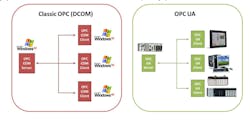Why OPC UA Matters
The OPC Foundation defined a set of standard interfaces that allow any client to access any OPC-compatible device using a protocol now referred to as Classic OPC. This protocol utilizes the Microsoft-based COM/DCOM technology to provide standard specifications for data access (DA), historical data access (HDA), and alarms and events (A&E). Although basing a protocol on this technology made sense in the 1990s, Classic OPC has several limitations because of this reliance on the Microsoft Windows platform, in the form of security issues and platform dependency.

